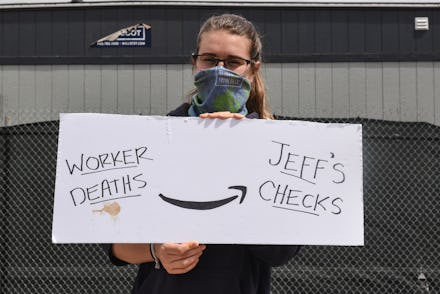Amazon workers are worried as more employees get sick, die from coronavirus

While the response to the coronavirus pandemic has left more than 36 million Americans unemployed, Amazon is one of the few employers that have actively continued to hire people throughout the crisis. The company claims to have brought on 175,000 new workers in recent months, primarily to fill roles that help meet increasing consumer demand. Yet while they rushed to staff up their warehouses, a report from the New York Times suggests that Amazon failed to take proper safety precautions early, resulting in outbreaks of coronavirus in some of its facilities.
According to the Times, an Amazon warehouse in the Pocono Mountains of Pennsylvania known as AVP1 has become a hotbed of coronavirus infections. The total number of those who have contracted the disease is unknown, but it is believed to be more than 100. Amazon stopped reporting each individual positive test after 60, and that inconsistent reporting has become standard practice across Amazon facilities, according to the report. The company has not disclosed how many workers have tested positive for the virus.
Jana Jumpp, an Amazon employee in Indiana, has been keeping an unofficial total of those who contract coronavirus. Earlier this month, she told CBS News' 60 Minutes that she estimated as many as 600 Amazon workers had tested positive. Just over a week later, she told the New York Times the number is up to 900, and that is believed to be an under-count of the real number.
As the number of infections among Amazon employees continues to rise, so does the death toll. Last week, it was reported that another Amazon worker died from coronavirus. The worker at the Amazon distribution center in Indianapolis, Indiana was the seventh known employee to die from complications related to the virus — and first since a New York Amazon worker passed on April 30.
Amazon has reportedly struggled to balance the need to implement new safety protocols for workers operating in relatively close and contained quarters while also keeping up with the increased demand. The company did send some workers home, assuming their roles allowed for it, and ditched its promises of one- and two-day shipping for non-essential products. It also attempted to introduce additional safety precautions across its facilities, though the Times reported that those measures were often poorly implemented and went unenforced. Workers in warehouses regularly stood next to one another despite social distancing rules being put in place, for instance. Other practices were introduced too late. While the company has purchased cameras that can scan workers for signs of fever, they weren't installed in some facilities until April, leaving early warning signs of coronavirus unchecked for at least a month.
"Our top concern is ensuring the health and safety of our employees, and we expect to invest approximately $4 billion from April to June on COVID-related initiatives to get products to customers and keep employees safe," Amazon spokesperson Lisa Levandowski tells Mic. "This includes spending more than $800 million in the first half of the year on COVID-19 safety measures, through purchasing items like masks, hand sanitizer, thermal cameras, thermometers, sanitizing wipes, gloves, additional handwashing stations, and adding disinfectant spraying in buildings, procuring COVID testing supplies, and additional janitorial teams. We’re also spending over $85 million redeploying team members from their typical roles to performing safety related tasks and audits at sites around the world like social distancing ambassadors to team members helping with temperature checks."
While positive tests mount, Amazon has largely continued operating its facilities. It announced today that it will re-open all of its distribution centers in France despite an ongoing dispute with labor unions over safety concerns and a court order that the company stop selling non-essential goods in the country. Similarly, Amazon continues to operate its US facilities, even as additional workers test positive. Its AVP1 facility remains open despite dozens of confirmed cases of coronavirus and outcries from the surrounding community and public officials to shut it down.
Amazon has, however, taken the precaution of closing facilities that have seen positive test results in the past. It temporarily stopped operations at a Kentucky plant, at the behest of the state's governor, following multiple employees testing positive for coronavirus. It similarly had a temporary stoppage at a delivery center in Queens, New York after a worker contracted the virus. These efforts haven’t been nearly effective enough in protecting workers, though, and Amazon’s lack of rigor when it comes to safety has led to an undetermined number of employees getting sick and dying.